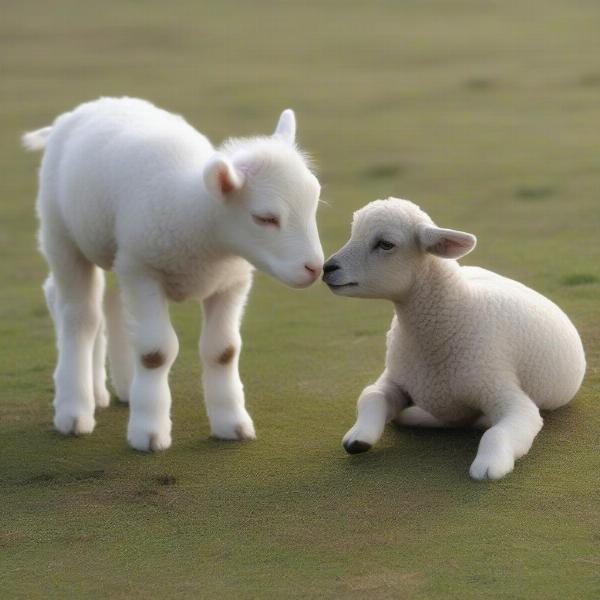LGD dogs for sale are increasingly sought after by farmers and homesteaders looking for reliable protection for their livestock. Finding the right LGD requires careful consideration of breed, temperament, and training. This comprehensive guide will help you navigate the process of finding, selecting, and integrating an LGD into your farm.
Understanding the Role of an LGD
LGDs, or Livestock Guardian Dogs, are specifically bred to protect livestock from predators. Unlike herding dogs, they bond deeply with the animals they guard, living amongst them and becoming part of the flock or herd. This inherent protectiveness makes them invaluable for safeguarding sheep, goats, poultry, and other vulnerable livestock.
Choosing the Right LGD Breed
Several breeds excel as LGDs, each with unique characteristics. Popular choices include the Great Pyrenees, Anatolian Shepherd, Akbash, and Maremma Sheepdog. Researching each breed thoroughly is crucial to finding one that suits your specific needs and environment. Consider factors like climate tolerance, predator pressure, and the size and temperament of your livestock.
Matching Breed to Livestock
Matching the right LGD breed to your livestock is essential for effective protection. For example, smaller, more agile breeds like the Spanish Mastiff might be better suited for protecting nimble goats, while larger breeds like the Great Pyrenees are often chosen for guarding sheep.
Finding Reputable LGD Breeders
Finding LGD dogs for sale from reputable breeders is paramount. A responsible breeder will prioritize the health and temperament of their dogs, ensuring they are well-socialized and possess the necessary instincts for livestock guarding.  LGD puppy with sheep Avoid purchasing LGDs from unknown sources or puppy mills, as these dogs may lack proper breeding and socialization, leading to behavioral issues and ineffective guarding.
LGD puppy with sheep Avoid purchasing LGDs from unknown sources or puppy mills, as these dogs may lack proper breeding and socialization, leading to behavioral issues and ineffective guarding.
Evaluating a Breeder
When evaluating a breeder, ask about their breeding practices, health testing, and socialization protocols. A good breeder will be knowledgeable and transparent, happy to answer your questions and provide references. They should also be interested in learning about your farm and ensuring their dogs are placed in suitable environments. homestead dogs
Preparing for Your LGD’s Arrival
Before bringing your LGD home, ensure your farm is properly prepared. Secure fencing is essential to prevent escapes and protect both your livestock and the LGD. Provide adequate shelter and access to fresh water. Introduce the LGD to your livestock gradually, allowing them to acclimate to each other under supervision.
Initial Introduction and Integration
The initial introduction between your LGD and livestock should be carefully managed. Start with supervised interactions in a controlled environment, gradually increasing the time spent together as they become comfortable. sell my livestock dogs
Training Your LGD
While LGDs have inherent guarding instincts, training is essential to refine their skills and ensure they integrate smoothly into your farm. Focus on basic obedience commands and reinforce positive behaviors. Early socialization with a variety of livestock and other animals is also crucial. guardian home for dogs
Ongoing Care and Management
LGDs require ongoing care and management to ensure their well-being and effectiveness. Regular veterinary checkups, vaccinations, and parasite prevention are essential. Provide a balanced diet formulated for working dogs and plenty of opportunities for exercise within the confines of their guarding duties. goat guard dogs for sale
Conclusion
Finding LGD dogs for sale requires careful research and planning. By selecting the right breed from a reputable breeder and providing proper training and care, you can gain a valuable partner in protecting your livestock. Remember, a well-trained LGD is an investment in the safety and security of your farm. how to train a livestock guardian dog
FAQ
-
How much do LGD dogs for sale typically cost? Prices vary depending on breed, breeder, and location, but expect to pay several hundred dollars or more for a well-bred LGD puppy.
-
Are LGDs good with children? While LGDs can be gentle and protective, early socialization with children is crucial. Supervise interactions and teach children how to respect the dog’s space.
-
Do LGDs need special training? While LGDs have natural guarding instincts, training is essential to refine their skills and ensure they integrate effectively into your farm.
-
How much space does an LGD need? LGDs need ample space to roam and patrol their territory. They are not suited for apartment living or confined spaces.
-
What do LGDs eat? Feed your LGD a high-quality dog food formulated for working breeds. Consult your veterinarian for specific dietary recommendations.
-
How long do LGDs live? The average lifespan of an LGD is 10-14 years, depending on breed and individual health.
-
Are LGDs aggressive? LGDs are protective by nature but not inherently aggressive. Proper socialization and training are essential to prevent unwanted aggression.
ILM Dog is your trusted source for comprehensive information on dog breeds, care, and training. We connect dog owners worldwide with expert advice, practical tips, and the latest in canine health and well-being. From breed selection to nutrition, behavior, and grooming, ILM Dog provides valuable resources for every stage of your dog’s life. Contact us at [email protected] or +44 20-3965-8624 for expert advice.